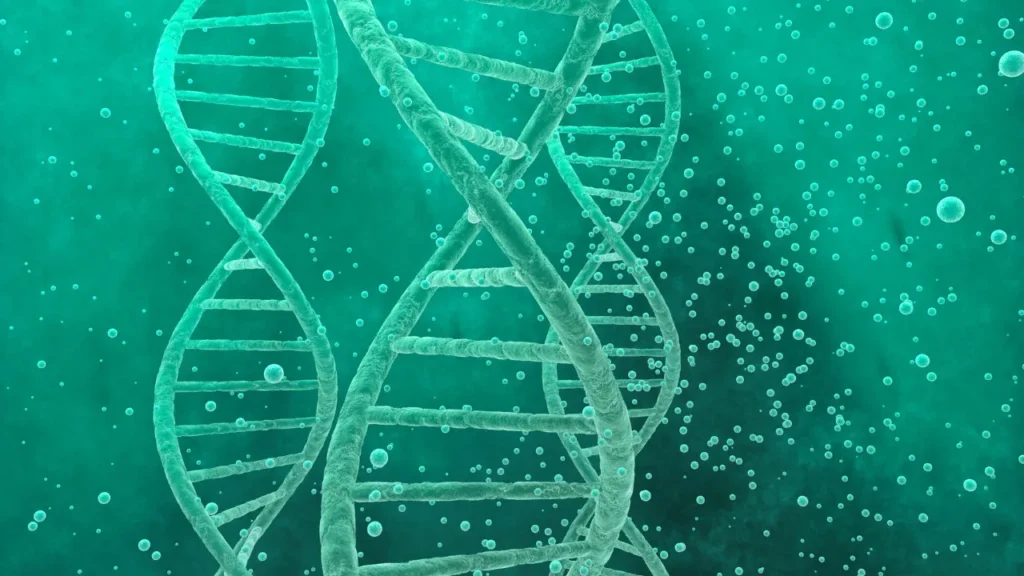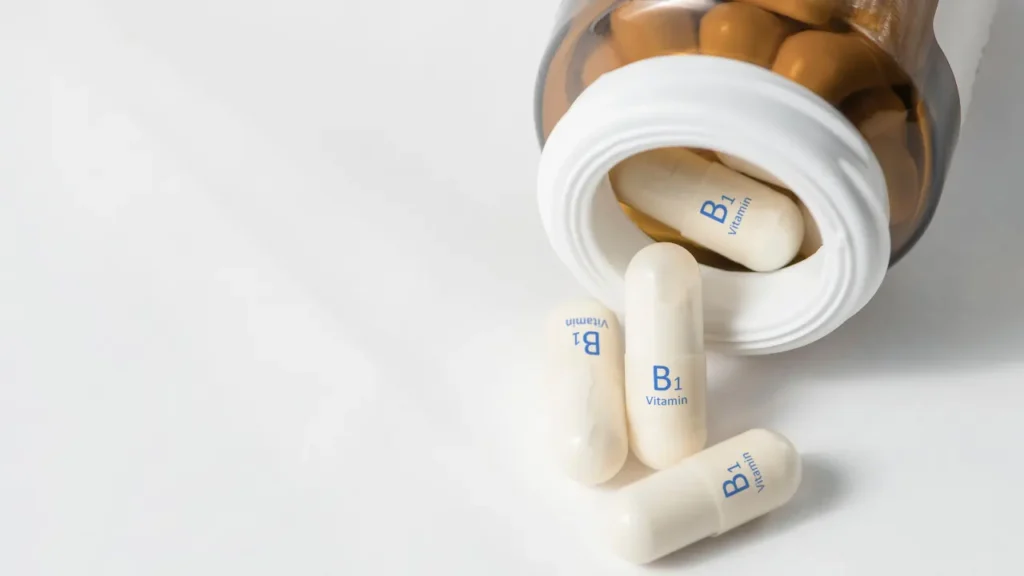Vitamin B1, also known as thiamine, is one of the essential B vitamins for good health. Because it is a water-soluble vitamin, it cannot be stored in the body and must be replenished frequently. Thiamine is best known for its role in energy metabolism. Still, it also plays a role in other essential physiological processes, such as nerve function, brain function, and carbohydrate metabolism.
You May Also Like:
CBD for Concentration: The Productivity Hack for Energy and Focus
Uridine: Benefits, Dosage, Side Effects, Drug Interactions, And Other Important Information
Vitamin B1 (Thiamine): Benefits, Dosage, Side Effects, Drug Interactions, And Other Important Information is an original (NootropicsPlanet) article.
Nature of Vitamin B1 (Thiamine)
Thiamine has the molecular formula C12H17N4OS and is colorless and crystalline. Heat, alcohol, and alkaline compounds can all destroy this heat-sensitive vitamin. Whole grains, fortified cereals, meat, seafood, nuts, and legumes are all high in thiamine. It can also be consumed as a dietary supplement.
Health Benefits of Vitamin B1 (Thiamine)
- Energy Metabolism: Thiamine transforms carbohydrates into glucose, the body’s primary energy source. Additionally, it aids in converting glucose into ATP (adenosine triphosphate).
- Thiamine is necessary for the correct operation of the nervous system, which is the second. It facilitates the synthesis of chemicals like acetylcholine, which is essential for memory and learning.
- Thiamine is crucial for cognitive function and brain activity. Studies have shown that thiamine supplementation may help older people with memory, focus, and reaction times.
- Thiamine is essential for creating red blood cells and preserving a healthy cardiovascular system. Lowering blood pressure and reducing inflammation also helps decrease the chance of developing heart disease.

Chemistry of Vitamin B1 (Thiamine)
Thiamine is a water-soluble vitamin belonging to the B-complex family. It is also called vitamin B1. The two significant parts of thiamine are a pyrimidine ring and a thiazole ring, connected by a methylene bridge. While the thiazole ring has sulfur and nitrogen atoms, the pyrimidine ring comprises carbon and nitrogen atoms. The coenzyme thiamine diphosphate (TDP), a cofactor for several necessary enzymes involved in energy metabolism and other cellular functions, is formed from the precursor thiamine.
Physiological Mechanisms of Action
Regular development and metabolism depend on thiamine. It is essential for the production of energy, the synthesis of neurotransmitters, and the operation of the nervous system, among other physiological functions. Thiamine pyrophosphokinase is an enzyme that changes thiamine into its functional form, TPP. TPP then participates in several metabolic processes in the body, including:
- Energy production: The enzyme pyruvate dehydrogenase uses TPP as a cofactor to change pyruvate, a byproduct of glucose metabolism, into acetyl-CoA, a molecule that joins the citric acid cycle and produces ATP, cells’ primary energy currency. Adequate thiamine levels are crucial for sustaining cellular energy production, supporting overall metabolic function, and preventing fatigue and lethargy.
- Coenzyme function: Thiamine primarily functions as a coenzyme, particularly thiamine pyrophosphate (TPP), which plays a central role in energy metabolism. TPP acts as a cofactor for several key enzymes involved in carbohydrate metabolism, including pyruvate dehydrogenase, alpha-ketoglutarate dehydrogenase, and transketolase in the pentose phosphate pathway. These enzymes facilitate the conversion of carbohydrates into energy, enabling glucose utilization for ATP production.
- Synthesis of neurotransmitters: Acetylcholine, a chemical required for memory and learning, is made by thiamine. The enzyme choline acetyltransferase, which creates acetylcholine from choline and acetyl-CoA, uses TPP as a coenzyme.
- Normal nerve system operation: Thiamine is necessary for the nervous system to operate normally. Its involvement produces myelin, a fatty substance that protects nerve fibers and hastens the transmission of nerve signals.
- Regulation of gene expression: Thiamine plays a role in gene expression and DNA repair processes essential for maintaining genomic stability and cellular integrity. TPP is required for the function of enzymes involved in nucleic acid synthesis and repair, including ribonucleotide reductase, which catalyzes the conversion of ribonucleotides to deoxyribonucleotides for DNA synthesis. Thiamine deficiency can impair DNA repair mechanisms, potentially leading to cellular dysfunction and increased susceptibility to DNA damage.
Overall, thiamine is an essential nutrient that is essential to numerous bodily physiological functions. It is necessary for gene expression, the synthesis of neurotransmitters, nerve function, and energy generation. Thiamine deficiency can cause severe health issues like beriberi and Wernicke-Korsakoff syndrome. As a result, it’s critical to ensure that the diet or dietary supplements contain sufficient amounts of thiamine.

Optimal Dosage of Vitamin B1 (Thiamine)
Adults should consume 1.1 mg of thiamine for women and 1.2 mg for males daily. The best thiamine dosage for improving brain function hasn’t yet been determined. Although some studies have employed daily doses of 100 mg to 500 mg, more studies are required to establish the ideal amount for improving cognitive function.
Side Effects of Vitamin B1 (Thiamine)
Even at large doses, thiamine is typically safe and well tolerated. However, a few individuals might experience minor side effects like a headache, skin rash, or stomach discomfort. Only very rarely can thiamine induce toxicity or an allergic reaction at large doses.
Potential Substance Interactions with Vitamin B1 (Thiamine)
- Alcohol: Thiamine insufficiency can result from prolonged alcohol use. Alcohol obstructs the body’s ability to absorb, store, and use thiamine. Supplementing with thiamine may be beneficial for people with alcohol use disorders.
- Diuretics: Diuretics like furosemide and hydrochlorothiazide can increase thiamine excretion from the body, resulting in thiamine insufficiency. People who take these medicines may need to take thiamine supplements.
- Antibiotics: Tetracycline and amoxicillin are two antibiotics that can reduce the gut’s ability to absorb thiamine. People who take these medicines may need to take thiamine supplements.

Best Responsible Uses of Vitamin B1 (Thiamine)
- Before taking thiamine supplements, talk to your doctor, particularly if you have a medical condition or are taking medication.
- A healthy diet should include thiamine-rich foods such as whole grains, meat, seafood, nuts, and legumes.
- Steer clear of heavy alcohol use, which can cause thiamine deficiencies.
- If you are at risk of thiamine deficiency or have a health issue that affects thiamine metabolism, you should consider taking thiamine supplements.
- Please adhere to the dosing guidelines and abstain from exceeding them when taking thiamine supplements.
- If you take any medicines, be mindful of possible drug-thiamine interactions and inform your doctor.
Vitamin B1 (Thiamine):
Conclusion
Thiamine, a vital B vitamin essential for overall health, offers many benefits crucial for maintaining optimal well-being. Its pivotal role in energy metabolism, nervous system function, heart health, digestive health, antioxidant defense, and mood regulation underscores its importance in supporting various physiological processes. Thiamine deficiency can lead to a range of health issues, including fatigue, cognitive impairment, cardiovascular problems, and digestive disturbances.
Incorporating thiamine-rich foods such as whole grains, legumes, nuts, seeds, lean meats, and fortified cereals into the diet can help meet daily thiamine requirements and promote overall health and vitality. Thiamine supplementation may benefit individuals at risk of deficiency or those with specific health concerns. Overall, recognizing the importance of thiamine in supporting optimal health underscores the significance of incorporating this essential nutrient into a balanced lifestyle for long-term well-being and vitality.

References:
- Thiamin – Health Professional Fact Sheet. Link: https://ods.od.nih.gov/factsheets/Thiamin-HealthProfessional/
- Thiamine – an overview. Link: https://www.sciencedirect.com/topics/earth-and-planetary-sciences/thiamine
- 6 Health Benefits of Thiamine (Vitamin B1). Link: https://health.clevelandclinic.org/vitamin-b1
Important Note: The information contained in this article is for general informational purposes only, and should not be construed as health or medical advice, nor is it intended to diagnose, prevent, treat, or cure any disease or health condition. Before embarking on any diet, fitness regimen, or program of nutritional supplementation, it is advisable to consult your healthcare professional in order to determine its safety and probable efficacy in terms of your individual state of health.
Regarding Nutritional Supplements Or Other Non-Prescription Health Products: If any nutritional supplements or other non-prescription health products are mentioned in the foregoing article, any claims or statements made about them have not been evaluated by the U.S. Food and Drug Administration, and such nutritional supplements or other health products are not intended to diagnose, treat, cure, or prevent any disease.


